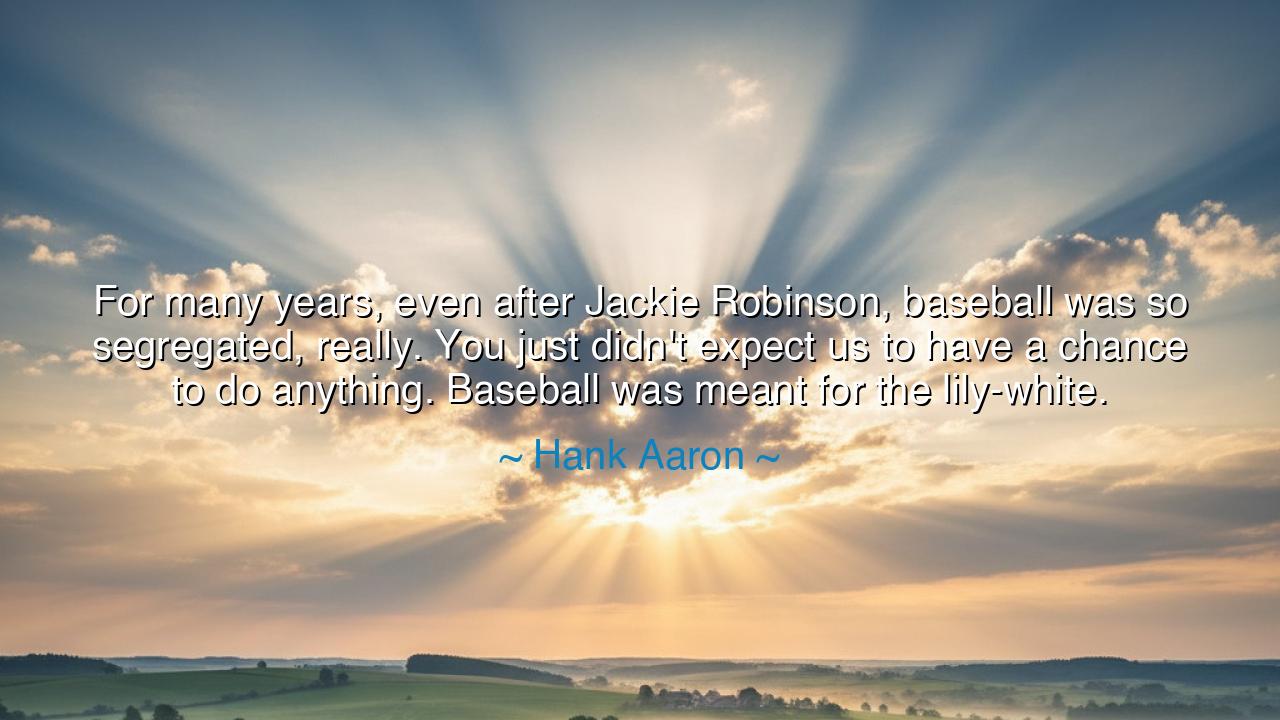
For many years, even after Jackie Robinson, baseball was so
For many years, even after Jackie Robinson, baseball was so segregated, really. You just didn't expect us to have a chance to do anything. Baseball was meant for the lily-white.






In the chronicles of human history, there are few struggles as enduring as that of the fight for equality. Hank Aaron’s poignant words, “For many years, even after Jackie Robinson, baseball was so segregated, really. You just didn't expect us to have a chance to do anything. Baseball was meant for the lily-white,” speak to the heart of a painful truth: for far too long, society was divided along the lines of race, and even the beloved game of baseball, a sport that symbolizes American culture, was not immune to these divisions. Aaron’s reflection is a testament to the barriers that were imposed, not just in sport, but in every arena of life, and the resilience required to break through them.
In those years, baseball stood as a symbol of the American Dream, but that dream was not accessible to all. It was a game that was, for the most part, reserved for white players, and the idea of a black man standing on the same field was not just seen as unimaginable, but unnatural to many. The belief that baseball was meant for the lily-white was a reflection of the broader societal belief that African Americans were inherently inferior, a sentiment deeply embedded in the fabric of society. Even after the groundbreaking achievement of Jackie Robinson, who broke the color barrier in 1947, the world of baseball remained divided. The struggles that Aaron describes were real, and the chances for black players to rise to the same prominence as their white counterparts were slim, if not impossible.
The story of Jackie Robinson himself serves as both an inspiration and a reminder of the courage required to defy systemic oppression. Robinson’s entrance into Major League Baseball marked the beginning of a new era, but the road to integration was paved with resistance, hostility, and discrimination. Robinson faced racism not only from fans but also from his own teammates and opponents. His every move was scrutinized, his every mistake amplified, and yet, he persevered, understanding that his actions were about more than just baseball. His fight was a fight for dignity, for the recognition that African Americans were just as capable, just as worthy, as any white man. Robinson’s bravery in the face of adversity is the backdrop against which Hank Aaron’s words resonate — the battle for recognition and opportunity did not end with Robinson’s integration of baseball; it was a battle that continued for many years, as Aaron and others faced the full weight of segregation, even in a game they loved.
Aaron’s own journey was one of perseverance against all odds. Despite his undeniable talent, Hank Aaron was forced to confront the harsh realities of racism throughout his career. Even after Robinson, he faced the reality that the doors of opportunity were not opened equally. In the face of hostility, both on and off the field, Aaron rose to become one of the greatest players in the history of the game, setting a record for home runs that would stand for decades. His journey was not just one of personal success, but a fight for dignity, a refusal to let the societal barriers of his time dictate his fate. Aaron's life was a quiet rebellion against the deeply entrenched norms of his time, proving that greatness is not defined by the color of one's skin, but by the strength of one's resolve.
In the broader context of history, Hank Aaron’s story is part of a long tradition of individuals who stood against the forces of injustice, those who refused to accept the limitations placed upon them. Consider the example of Nelson Mandela, who fought for the rights of his people in a nation that denied their humanity. Like Aaron, Mandela’s journey was not just about personal triumph, but about the systemic change that would uplift entire generations. His sacrifice, like Aaron’s, was not just for his own advancement, but for the collective freedom and dignity of those who had been oppressed.
The lesson of Aaron’s words is one that calls us to reflect on the barriers that still exist in our own time. Though we may have made progress, we must not forget the struggles of those who came before us. The fight for equality and justice is not just about overturning laws but about changing the hearts and minds of people. Hank Aaron teaches us that greatness is achieved not by accepting the status quo, but by challenging it, by believing in oneself even when others refuse to see your value. His perseverance in the face of racial prejudice shows us that history is not a line of inevitable progress, but a battleground where each victory is earned through resilience and courage.
In our own lives, let us remember the words of Hank Aaron and the lessons of those who fought for the opportunity to rise above the constraints of their time. No matter the challenges we face, we must continue to press forward, fight for equality, and never accept mediocrity as our fate. Whether in the field of sport, in our careers, or in our relationships, we must believe in the possibility of breaking down the walls that divide us, and in the strength of our individual and collective resolve. Let us, like Aaron, take the chance to reshape the world, knowing that greatness is not reserved for the privileged, but is within the reach of all who dare to rise above the barriers that seek to hold them back.






AAdministratorAdministrator
Welcome, honored guests. Please leave a comment, we will respond soon